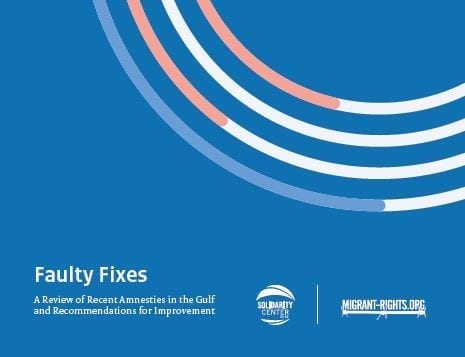In Gulf Cooperation Council countries—Bahrain, Kuwait, Oman, Qatar, Saudi Arabia and the United Arab Emirates—amnesties for workers in irregular status are frequently declared, indicating that irregularity is a common and recurring phenomenon within the governing kefala, or work-sponsorship, system. However, even if implemented perfectly, amnesty is a temporary fix, and effective solutions to reduce the population of undocumented migrant workers requires adherence to labor rights principles, according to a new report by the Solidarity Center and Migrant-Rights.org.
The GCC countries are characterized by a majority migrant workforce, tied to their employer-sponsors through kefala. However, for workers whose sponsors fail to renew work visas or for workers who are duped by fake jobs in the recruitment process or who land in untenable and abusive situations, workers “face a series of narrow, unenviable choices and are systematically denied freedoms enshrined in international human rights law,” says the report, Faulty Fixes: A Review of Recent Amnesties in the Gulf and Recommendations for Improvement.
In fact, the report adds: “Migrant workers who are unable to legally leave their job, or leave the country in some cases, are vulnerable to a range of abuses including occupational safety and health violations and gender-based violence as well as non-payment of wages and other forms of forced labor.”
The report has a variety of recommendations for countries of origin and Gulf nations to improve working conditions for migrant workers and to minimize factors that push them into irregular status. Among them: planning and communicating about an amnesty with migrant worker embassies and communities; investigate absent or abusive sponsors; and informing workers about their rights.

